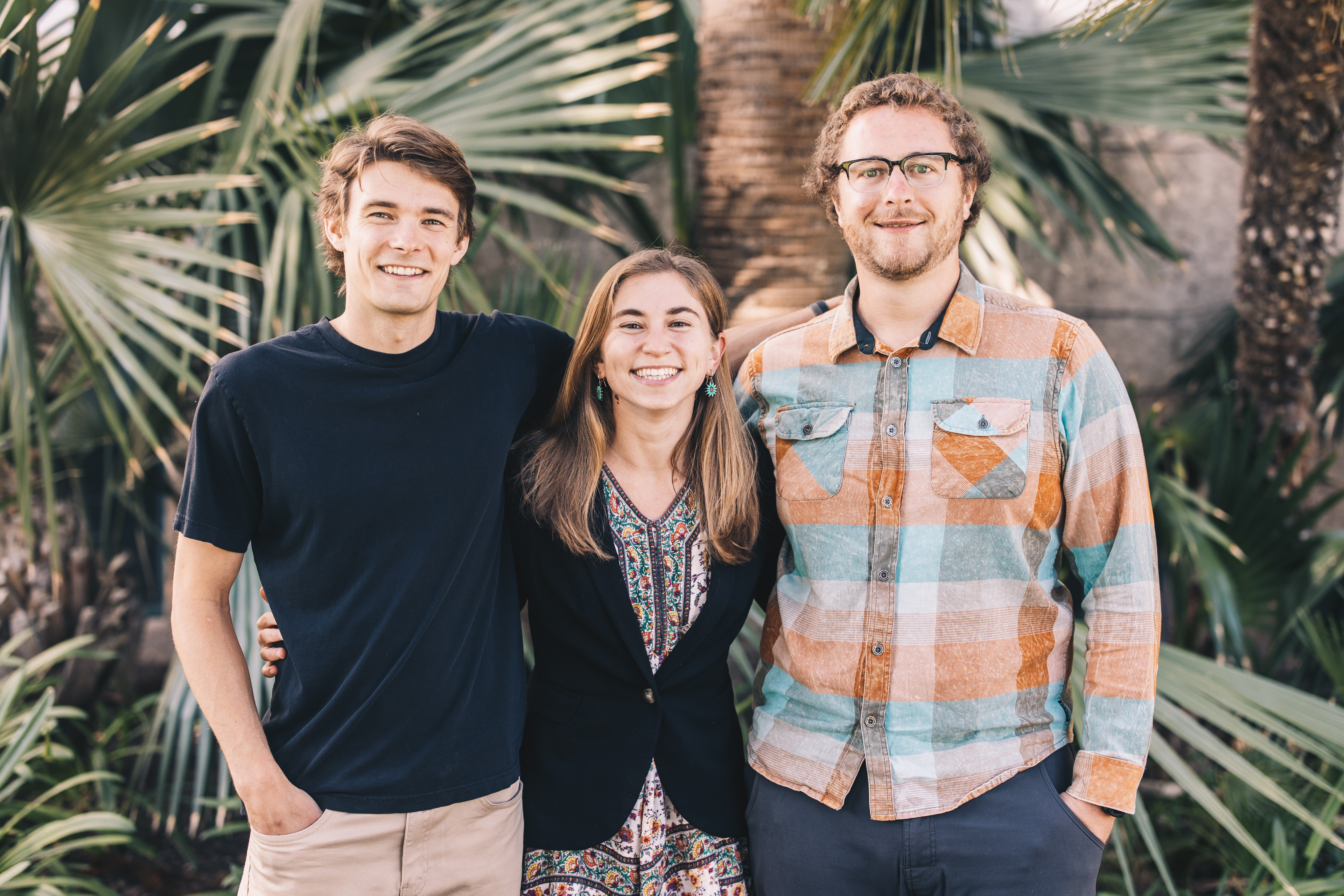Overview
Getting to know the 2022 Fellows
Fri, May 27, 2022
This year the Ocean Health Index Global Fellows program has taken on three new Data Science and Communication Fellows. All three fellows have been picked from the new Masters of Environmental Data Science (MEDS) program, jointly taught through the Bren School of Environmental Science and Management and the National Center for Ecological Analysis and Synthesis (NCEAS).
In this blogpost, we ask the incoming fellows questions to better understand their motivations while getting to know them.

Question 1
Where are you from?
Cullen: I grew up in the suburbs of Chicago and finished high school in Southwest Michigan. Following high school I moved to Arcata California for college and lived there for 7 years before finally moving to Santa Barbara for work.
Juliet: I’m from Southern California and grew up with both the Santa Monica mountains and Pacific ocean within reach. I moved around California and Hawaii as a biological technician and returned to Santa Barbara for school and work.
Peter: I was born and raised in Raleigh, North Carolina. My love for the mountains took me to Asheville, NC, located among the southern Appalachians, where I lived for almost 8 years before moving out to Santa Barbara.
Question 2
What are some of your interests, personally and professionally?
Cullen: I am interested in most outdoor activities. I particularly enjoy mountain biking, cycling, and scuba diving. Professionally, I am interested in open science and using open science technologies and philosophies for making progress towards understanding our world, especially our oceans.
Juliet: I enjoy all things outdoors like hiking, surfing, snorkeling, and climbing. Observing animals and plants in the wild helps me brainstorm new ways to apply my programming skills and refreshes my brain. Professionally, I’m interested in spatial modeling and creating a sense of community in the programming world. Coding and asking questions can be intimidating, and I hope I can help break down psychological barriers for other early-career scientists by adopting OHI’s methods.
Peter: I’m generally fascinated by technology, the natural world, and particularly the confluence of the two. Professionally, I’m drawn to the idea of leveraging innovations to help conserve the environment and mitigate climate change—whether those innovations are machine learning techniques, advancements in remote sensing, carbon capture technologies… The list goes on. I’m also interested in pursuing these goals in an open and collaborative way—utilizing open data, open-source tools, and reproducible methods. Personally, I love to climb, play guitar, hang out with my cats, and learn about animals, technology, and the universe.
Question 3
What drew you to the Ocean Health Index, and what are you excited to learn?
Cullen: I was first exposed to the Ocean Health Index through the Master of Environmental Data Science Program. My first introduction was largely around how OHI was able to restructure their work to be more open and reproducible. After looking into what the project was about I was amazed by the scope of the project and the magnitude of the ambition it took to initiate such an index. I am excited to learn more about their specific methods and to become integrated into their process while updating the 2022 scores.
Juliet: I’m drawn to the Ocean Health Index because of the emphasis on using a reproducible and scientific approach to find the balance between human livelihoods and marine ecosystem health. I think that OHI bridges the gap between the two huge struggles we will face with climate change (ecological degradation and humanitarian crisis) and that interdisciplinary approaches will be integral to finding sustainable solutions.
Peter: With an affinity for mountain environments and a background in terrestrial ecology, I’m a bit surprised to find myself as an OHI fellow—but living, for the first time in my life, a short walk from the beach has ignited in me a passion for the ocean. As part of the OHI, I’m thrilled to learn more about ocean ecosystems and how humans can sustainably benefit from their myriad resources.
Question 4
What is something you have recently read or learned that you found interesting and want to recommend to others?
Cullen: I recently finished a book Abalone: The Remarkable History and Uncertain Future of California’s Iconic Shellfish by Ann Vileisis. It is a very interesting and comprehensive look at the role abalone have played in the ecology, history, and culture of the west coast. The author does an excellent job at putting this iconic species into context and I highly recommend this book even to those who do not know what abalone are.
Juliet: Through the book Into the Planet: My Life as a Cave Diver by Jill Heinerth, I recently learned about the sport of cave diving in the extensive underground systems of Mexico and Florida. I am amazed by the idea of swimming through a labyrinth of undocumented freshwater caves. It’s a good reminder that we can never understand everything about the world, but we can keep trying.
Peter: I’m currently listening to the audiobook Something Deeply Hidden written by Sean Carroll, and highly recommend reading or listening to it. The book is about quantum mechanics. I was initially apprehensive about approaching such a dense topic, but Carroll, a theoretical physicist at CalTech, masterfully conveys the subject in an accessible and captivating way. He has me convinced that the existence of many worlds is the most logical explanation of what we have observed and understand about quantum mechanics so far.